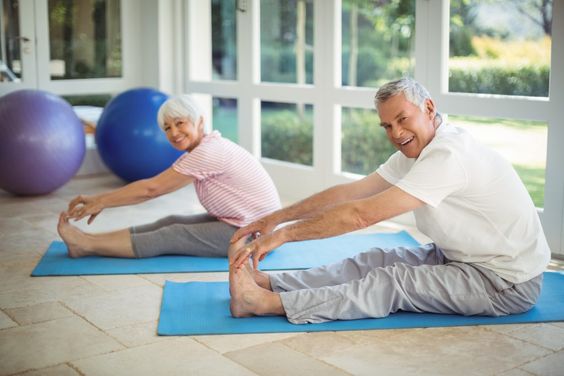5 Best Exercise Programs for Seniors
5 Best Exercise Programs for Seniors
Seniors must continue to remain physically active to preserve their general health, mobility, and well-being. A well-designed exercise regimen may boost mental well-being, increase flexibility and balance, and help avoid chronic illnesses. These are the top five fitness regimens designed with elders in mind.

1. Programs for Walking
Why it’s excellent Walking is a low-impact, joint-friendly activity that doesn’t require any extra equipment. Seniors can do it anywhere, which makes it very accessible.
Benefits include:
- Enhances heart health
- Improves mood and eases tension
- Aids with controlling weight
- Fortifies bones and muscles
Tips for getting started:
- Walk for shorter, more manageable distances at first, then progressively increase the distance and speed.
- Put on supportive, comfortable shoes.
- Make walking a part of your everyday routine by going on walks in your neighborhood or to the shop.
2. Tai Chi
Tai Chi is a gentle form of martial arts that focuses on slow, deliberate movements and deep breathing. It is particularly beneficial for improving balance and flexibility.
Benefits:
- Enhances balance and coordination
- Reduces the risk of falls
- Lowers blood pressure and improves heart health
- Reduces stress and anxiety
Tips for getting started:
- Look for a local Tai Chi class specifically designed for seniors.
- Follow along with instructional videos if in-person classes are not available.
- Practice regularly to gain the most benefit from the gentle movements.
3. Exercise for Strength
Muscle mass is essential for everyday activities and general strength. Strength training aids in its development and maintenance. Exercises with body weight, resistance bands, or free weights can be used.
Benefits:
- Improves the endurance and strength of muscles
- Increases bone density and lowers osteoporosis risk
- Increases metabolism and helps in controlling weight
- Promotes flexibility and joint health
Tips for getting started:
Start with little weights or resistance bands and work your way up to greater resistance.
Pay attention to the following key muscular groups: arms, shoulders, back, chest, abdomen, and hips.
Exercise your strength two to three times a week, with one day off in between.
4. Do Yoga
Yoga incorporates meditation, breathing techniques, and physical postures. It works wonders for enhancing balance, mental clarity, and flexibility.
Benefits:
- Increases range of motion and flexibility
- Improves balance and lowers the chance of falls; encourages rest and lowers stress
- Enhances respiratory performance
Tips for getting started:
- Look for a yoga class designed for beginners or elders.
- For support and balance, make use of objects like chairs, blocks, or straps.
- Practice daily, even if it’s only for a little while.
5. Aerobics in Water
Water aerobics offers a full-body, low-impact exercise. For elderly people with arthritis or other movement problems, the buoyancy of the water eases joint tension.
Benefits:
- Enhances heart health
- Increases the strength and endurance of muscles
- Increases range of motion and flexibility
- Lessons on stiffness and joint pain
Tips for getting started:
- Attend a water aerobics class at the community center or pool nearby.
- Make sure the pool has a shallow end for safety and that the water temperature is acceptable.
- When performing workouts, put on water shoes for improved support and grip.
In summary
In order to preserve their independence and health, elders must engage in regular exercise. Excellent exercise regimens that are suited to the demands of older individuals include walking, Tai Chi, yoga, strength training, and water aerobics. You may raise your quality of life, feel better emotionally, and improve your physical health by adding these activities into your daily routine. Before beginning any new fitness program, be sure it is safe and suitable for your particular health issues by speaking with your healthcare professional.


